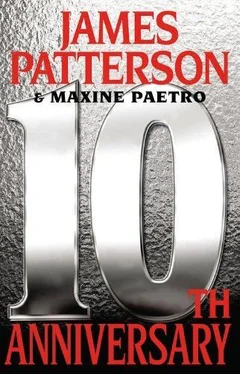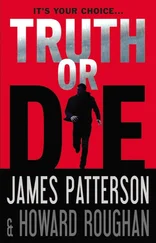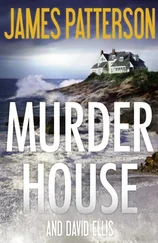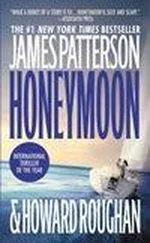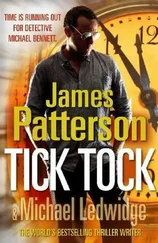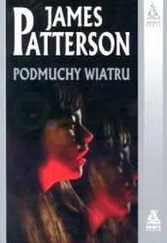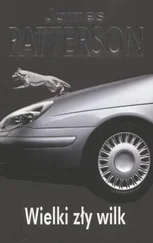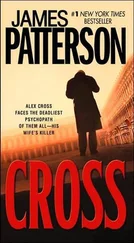But if you’re a cop and you don’t bring everything you’ve got to nailing the bad guys, what the hell is the point? For the same time and money, you might as well be punching tickets on a train.
We gassed up the Explorer outside Williams, then had lunch at Granzella’s, a restaurant that looked like a feed store on the outside and a hunting lodge inside. Claire and I sat at a table under the mounted heads of deer and bear as well as zebras, water buffalo, and long-horned goats.
Along with the exotic taxidermy, Granzella’s specialized in a very nice linguine with a spicy red sauce. While we ate, I groused about Avis.
“She’s wasted more than a week of our time, Claire. And she’s such a liar, even this could be a flyin’ goose chase.”
Claire clucked sympathetically as I ranted, then raised the heat by reminding me about the last big case we’d worked together. Pete Gordon, a bona fide psycho killer, had murdered four young moms and five little kids a few months ago in a murder spree that had torn me and Claire to pieces.
I went to the bathroom, sat on the rust-stained throne, and got some major weeping out of my system. Then I washed my face, came out, and said to Claire, “I’ve got the check. Let’s go, butterfly.”
We were back on the road again by a quarter past two. About two hundred miles north of San Francisco, the freeway crossed a section of Shasta Lake.
For the first time in a week, I stopped thinking of babies. The sight of pink-and-yellow sandstone banks rising from the impossibly vivid bands of sea-green and peacock-blue water simply blew everything else out of my mind.
And then sightseeing was over. Surely we would find Avis’s baby boy. Surely we would.
We pulled into Taylor Creek at 5 p.m.
It’s a one-traffic-light town, a typical small town in the great northwest. Main Street was a row of western facades from the late 1800s. Brick buildings that were once banks or warehouses now housed boutiques and small storefront businesses.
Cars crawled along the main drag. Streetlights and headlights came on as the sunlight faded to a streak of pink.
“I want to drive by Antoinette Burgess’s house,” I said to Claire. “Get a fix on the place.”
The disembodied voice of the GPS guided us to Clark Lane, a narrow, tree-lined street with a sign reading DEAD END. Green picket fences edged the front yards, and behind the fences was an assortment of homes from different decades — Victorians, ramblers, Craftsmans, and ranches.
The house belonging to Antoinette Burgess was a cedar-shingled A-frame with a wraparound deck and a satellite dish on the roof. I saw no lights on inside the house and no car in the driveway.
I parked the Explorer on a pile of fallen leaves at the curb, and Claire observed, “Looks like no one’s home, Lindsay.”
I thought, Excellent opportunity to poke around .
I turned off the headlights and said, “Be right back,” and got out of the car.
THE FRONT YARD was unkempt; the grass hadn’t been mown, and the leaves hadn’t been raked. To my right, a weedy gravel driveway flowed past the house to an open, freestanding two-car garage.
I flicked on my flashlight and proceeded down the driveway, the pea stone and dry leaves crunching loudly underfoot.
The garage smelled of motor oil, and there was grease on the floor. I flicked my light across a rowboat in the rafters, stacks of plastic tubs, and cartons of what looked like motorcycle parts: sprockets, valves, and brake shoes.
There was nothing of interest here.
I left the garage and headed toward the back of the house. Flashing my beam through the multipane windows. I could make out worn furniture, a woodstove, and a baby’s car seat on the kitchen table.
My eyes fixed on the car seat. It was blue and it was empty. My heart rate jacked up another twenty beats a minute as I put my hand on the doorknob and twisted.
The door was unlocked — but a half second before I pushed the door open, I saw a tiny red flashing light reflected in the microwave door across the room.
Burgess had an alarm system, and the house was armed.
I let go of the doorknob, and at that moment, I heard the distant sputtering and roar of motorcycles, a sound that got louder the closer it got to Antoinette Burgess’s house.
The bikes were coming to this house, I was sure of it. I had to get out of here.
I turned off my flashlight and retraced my steps by the waning glow of twilight. Claire buzzed down the window and called out to me, “You hear that, Linds?”
“Couldn’t miss it,” I said.
I pulled myself up into the driver’s seat and started the engine as a stream of seven or eight single headlights drew closer.
My wheels whinnied as I jammed on the gas, spun out, and left the curb in a sharp U-turn.
“That was smooth. You think anyone could possibly have noticed us?” Claire asked as she gripped the dash.
“Hey, that’s me. Subtle as a jackhammer.”
We passed the motorcycle cavalcade coming toward us and I continued up the street with my eyes on the rearview mirror. Bikes wheeled up to the Burgess house and turned down the driveway toward the garage.
Was Antoinette Burgess in that motorcade?
Where was the baby?
I glanced back at the mirror and saw the silhouette of a biker who had stopped at the entrance to the Burgess driveway. The bike was still there and the biker was still astride it as I took the next right turn and sped away.
Crap.
It looked like someone had taken down my plate number.
THE HOTEL CLEARWATER was a faded blue two-story Victorian facing Main Street, with a second-floor exterior balcony supported by columns. It looked right out of the Wild West or maybe a movie featuring Sundance and Butch.
Claire and I entered the lobby, which hadn’t seen any changes since the 1920s. I took in the Victorian flock wallpaper, satin-covered armchairs, and sepia photographs of long-dead people in ornate frames on the walls.
The man behind the desk was also a relic of earlier times. Not from another century, but definitely from another time. His thinning gray ponytail and frameless specs made me think the hotel had been named for Creedence Clearwater Revival, a band I liked from the ’70s.
I signed the register and credit-card receipt and collected the keys. As Claire called home, the desk clerk told me his name was Buck Keene and that he owned the place.
We chatted about the weather and the local restaurants, and then I said, “I’m trying to look someone up. Maybe you know her? Antoinette Burgess?”
“Everyone knows everyone here. Sure, I know Toni. She’s the president of Devil Girlz — with a z . It’s a motorcycle club, girls only. They mainly work as bouncers for one of the saloons in Winchester.”
“She has a friend — Sandy someone?”
The man with the gray ponytail jerked back as if he’d said too much or I’d put ammonia under his nose.
“You’re a cop,” he said. “I should have figured as much.” He opened a drawer to show me his sheriff’s badge, and I showed him my shield.
“Is Toni in trouble?” Keene asked.
“Not at all. I just want to talk with her about an ongoing investigation.”
“Then find another source,” Keene told me. “She’s had a rough time, but she’s clean. Getting her life straightened out. Being questioned by the cops …” Keene shook his head. “Checkout is at noon tomorrow.”
The bathtub in my room had claw feet. The towel rack was brass, and there was a basket of toiletries on the pedestal sink. I ran the hot water, poured some bath salts into the tub, and called Conklin.
“Antoinette Burgess is in a motorcycle gang called Devil Girlz,” I told him. “Outlaw type, I’m guessing.”
Читать дальше
